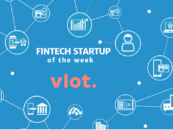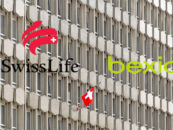
Shaping the Future of Fintech and Insurtech: Insights From Switzerland’s Top Startup Competition Winners
by Fintechnews Switzerland July 12, 2023Switzerland’s premier startup competition, >>venture>>, recently concluded its highly anticipated Award Ceremony on June 26th at EPFL, where it crowned the most promising early-stage startups in the country. The Finance & Insurance vertical winners, namely Frigg, grape, and Ascentys, were among the celebrated victors. We had the privilege chatting with these exceptional startups to explore their endeavors and gain insights into their visions for the future of sustainability and impact in the fintech/insurtech domain.
The >>venture>> competition not only recognizes outstanding startups but also provides them with invaluable support. Winners of the competition are granted exclusive access to mentorship and coaching from industry experts. Moreover, they receive funding to kickstart their entrepreneurial journeys, with the 1st, 2nd, and 3rd place winners receiving CHF 50,000, CHF 20,000, and CHF 10,000, respectively, in non-dilutive cash prizes.
Frigg, the 1st place winner of the Finance & Insurance vertical within the >>venture>> startup competition, has developed a legally compliant software that streamlines the creation of tokenized Green Bonds backed by sustainable infrastructure projects (i.e. renewables). They embed real-time environmental performance data with end-to-end transparency from the source.
We spoke to Philip Berntsen, CEO of Frigg, to understand more about his point of view of where the opportunities lie for a fintech focused on sustainability.

Philipp Bernstein at the Venture 2023 Award Ceremony, Monday, June 26, 2023 at the SwissTech Convention Center in EPFL (Ecole Polytechnique Federale de Lausanne). (Valentin Flauraud for Venture)
Philipp, you claim advantageous regulatory treatment of sustainable digital assets. In what does the regulator treat sustainable assets more favorably? Will future tightening of the regulatory landscape for digital assets take any of these advantages (if there are any) away?
Currently, there is a massive regulatory push for sustainability reports, and there is only going to be more and more demand. Not only do regulators want sustainability reports, but they are also becoming increasingly strict on what lies behind those numbers.
DLT is nascent, and it’s almost like building a financial infrastructure in a way that they learn from the mistakes that have been made in the past and impose only what works into the new framework.
This presents a new opportunity for us, not to be more stringent, but rather more beneficial. We must sit close to the legislators to make sure regulation is purposeful but also allows innovation to flow.
Why do you issue in Switzerland? Is the Swiss legal / regulatory landscape favorable or limiting for international originators?
I would say it’s favorable because there are regulatory thresholds to consider. Switzerland is an innovative progressive hub, but the challenge is to find value for money. For this, you need to go to emerging markets.
But Switzerland is enabling for Frigg because it supports the DLT law. This new bill allows us to provide transparency into what the assets are doing to help society in an immutable way. This means we’re facilitating connectivity to impactful projects with inherent transparency and there’s a big opportunity here.
What new opportunities does focusing on the SDGs provide for budding entrepreneurs in the fintech space?
The SDGs provide a good framework to channel innovation to the right places. There’s a lot of interest and willingness to fund these initiatives.
More importantly, however, one of the biggest opportunities we’ve seen is the increase in transparency and trust.
The second-place winner, grape, is Switzerland’s the first fully digital employee insurance that invests in employees’ physical and mental health by using new data points and machine-learning techniques. Here’s what co-founder and CEO, Gregory Inauen, had to say about innovation in insurtech.

CEO, Gregory Inauen with the Chairman of the >>venture>> foundation, Ulrich Jakob Looser (Valentin Flauraud for Venture)
Gregory, how does your startup innovation address existing challenges or inefficiencies in the financial or insurance industry?
Grape offers various employee insurance products (KTG, UVG/Z) bundled with an end-to-end B2B software solution that allows our clients to automate the processing of their claims, provide them insights with analytics and introduce health initiatives in their companies.
Grape is tackling both the lack of automation and digitalisation, as well as the scarcity in employee’s health promotion by offering a digital insurance that incentivises health amongst our customer’s employees.
What makes us different is that at grape we bundle our employee insurances with our B2B software and through its automation and integrations into more than 50 payroll and time-tracking software, we reduce administrative work, therefore saving HR teams time for claiming, reporting, and payroll adjustments. Additionally, we are the first insurer actively investing in mental health initiatives and supporting companies to roll out prevention campaigns in their company through our health benefits.
One could say that traditional insurers are not yet ready for your solution. What about the reinsurers? How do they react to your offering and does grape get any favorable terms from the reinsurers based on your focus on prevention?
Our competitors, the traditional insurers, are lagging behind in innovation and building software solutions to tackle the high frequencies of claims in the group health and group accident field. Manual processes around underwriting and claiming lead to high administrative costs with traditional insurers which squeeze the margins for insures and therefore lead to higher prices and lower profitability. Communication and administration can cost up to 30% of the premium. Grape’s fully digital approach and automation with E2E integrations into the systems of our customers allow us to be much more efficient in processing claims and managing the portfolio.
Today’s underwriting is limited to a few factors and little prevention is deployed compared to other insurance lines, resulting in high loss ratios. No incumbent insurers analyze or prevent sick leaves and accidents, even though trends in employees’ health show concerning results, experiencing a rise in claims linked to mental health issues in recent years.
Our approach with collecting structured data from day 1 and while processing every claim helps us to improve prevention and intervention and improving our pricing during underwriting which is very interesting business case for our reinsurance partner providing us capital and additional capital.
How we leverage data:
Early detection: Insurers today are being informed about a leave cases (claim) when it is already too late. We monitor sick leave from day 1.
Pattern recognition: We identify unusual sick leave patterns and offer early interventions to lower the number of long-term leaves.
Targeted interventions: We apply interventions early, such as case management, coaching, part-time work, mental health therapy or remote work to reduce the risk of long absence and burnouts.
Strengthening the underwriting: Over time our models learn and better understand data patterns and the health risks of a company.
Can you highlight any specific features or technologies that differentiate your solution and contribute to sustainability?
Companies that are insured with us receive much more than just their insurance coverage, companies insured with us also receive access to our software platform supporting them in the claims process, analytics and benchmarking about their absences and leaves of employees, giving access to our health partners to deploy health prevention and coaching initiatives in the company.
We aim to reinvent employee insurance and health prevention at the workplace and by doing so increase productivity and improve employees’ physical and mental well-being.
Through our health platform employees’ insured by grape receive access to numerous health benefits that intend to foster healthy habits within and outside the workplace. We provide these health benefits by collaborating with companies that offer health-promoting or -enhancing products and services. These include therapy and coaching sessions, company retreats and workshops, modern sports equipment, CHM-programmes, meditation apps, gym subscriptions, healthy food and company fridges, as well as high quality self-care products.
What new opportunities does focusing on the SDGs provide for budding entrepreneurs in the insurtech space?
This part of our product goes hand-in-hand with goal number 3 – Good health and well-being – of the UN Sustainable Development Goal, which reads “Ensure healthy lives and well-being for all at all ages”. We support our customers in fostering health within their company, removing any stigma about mental health and preventing burnouts, depression and anxiety. Action is needed in order to support workers in carrying a balanced and healthy life. particularly in this day and age, where issues related to mental health are rising increasingly as shown by several statistics. For instance a survey carried out by Gesundheitsförderung Schweiz shows that in 2022 the percentage of Swiss employees who felt emotionally exhausted reached 30.3%
Besides contributing to changing the way health at work is perceived and managed and therefore improving current working conditions embossed by high levels of stress and anxiety, grape is changing the way employees’ insurances are handled, by digitising the claiming process and using machine learning for underwriting. This reinvention of the management of employees’ insurance contributes to modernising a market that is currently not keeping pace with the times. Grape helps achieve higher levels of economic productivity through technological upgrading and therefore resonates with Goal number 8 – Decent work and economic growth- which reads “promote sustained, inclusive and sustainable economic growth, full and productive employment and decent work for all”.
Last, but certainly not least, we chatted with Jerome Raguin, CEO of Ascentys, the third-place winner of the >>venture>> competition. Ascentys has developed a platform that helps companies measure, manage, report and improve their ESG performance in a way that is simple, accurate, defensible and cost-effective.

Jerome Raguin, CEO of Ascentys (Valentin Flauraud for Venture)
Jerome, let’s talk privacy. Does Ascentys with your SaaS-Solution get access to confidential GDPR-covered employee data? How do you handle that?
We contract directly with our customers and have their consent to use their data. Our customers can upload their data onto our secure platform which is hosted in Switzerland with SafeSwissCloud- military grade hosting.
Their data is fully anonymized- we remove any PID (Personal Identifiable Data) in addition to any corporate identifiers (name, logo, tag lines, product pictures etc).
How do they validate their ESG indicators?
We have validated our indicators with relevant experts (Academics, NGOs or organisations) for each domain.
For example: The “Tax Transparency Network” NGO validated our approach to measuring Tax Transparency, our Carbon Footprint methodology is aligned with the GHG Protocol, and our Diversity KPIs were developed in collaboration with some DE&I advocates in the UK and Germany.
Can you share any insights or lessons learned for other early-stage fintech startups interested in pursuing impact and sustainability goals?
There is a certain amount of “healthy skepticism” on the impact that FinTech startups can really deliver. Every company uses the word “impact” but in some cases it is not clear what their impact truly is (and that can be seen as posturing or Greenwashing).
In the end, I say be very practical, clear, transparent about how your start-up truly moves the needle and has a positive impact on the community you are serving (for example by referring to the SDGs).
What new opportunities does focusing on the SDGs provide for budding entrepreneurs in the fintech space?
The SDGs offer a simple framework for companies of all sizes (even start-ups) to say “great, we have an impact on Access to Finance” (SDG9.3 – Increase access to Financial Services & Markets).
Besides acting as a “Sustainability North star” in terms of mission, it helps message your value in a language that investors and customers are familiar with.
Venture Competition 2024, Application Opens 1.October
To learn more about the winners of the >>venture>> competition or to learn how you can participate in the 2024 edition, visit https://bit.ly/3PP5zlu. The application period for the 2024 edition of >>venture>> will open on October 1, 2023.
Featured image credit: Philip Berntsen, CEO of Frigg, Gregory Inauen, CEO of grape and Jerome Raguin, CEO of Ascentys. All images are credited to Valentin Flauraud.





